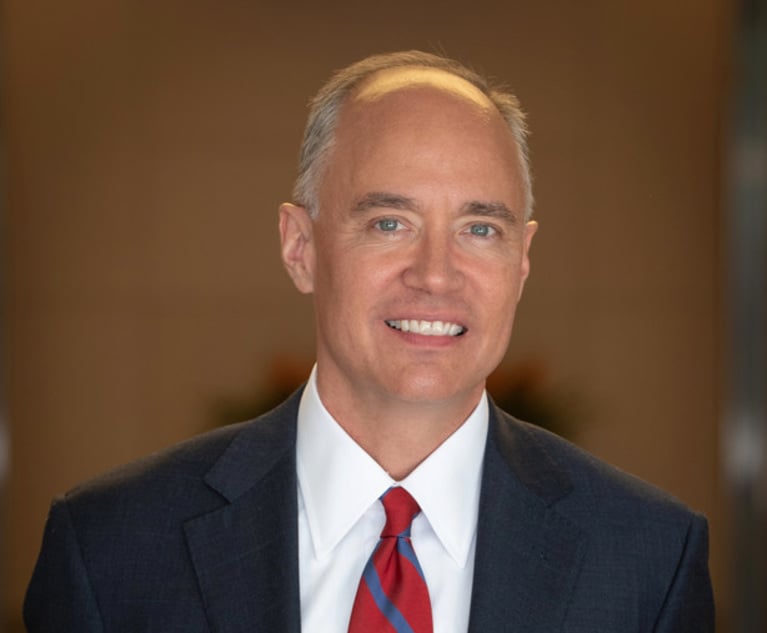 Maura Kathleen Monaghan, with Debevoise & Plimpton.
Maura Kathleen Monaghan, with Debevoise & Plimpton.Fifth Circuit Unravels FDCPA Class Action After Finding No Common Issue
A panel of the U.S. Court of Appeals for the Fifth Circuit, including two Trump appointees, also found there were "substantial questions" about the standing of unnamed class members but based its ruling on the plaintiff's lack of commonality, typicality and predominance.
January 09, 2020 at 04:31 PM
4 minute read
A federal appeals court has decertified a class action brought under the federal Fair Debt Collection Practices Act after finding that the lead plaintiff had no claims that were common or typical to the class.
The U.S. Court of Appeals for the Fifth Circuit ruled Wednesday that a district judge should not have certified a Texas class of 7,650 customers of Seton Medical Center Hays who received letters from a debt collection services provider. The panel, two of whom are appointees of President Donald Trump, found there were too many variances in how Seton's customers might have interpreted the letter to establish a common issue, as required under the federal Rule 23 of Civil Procedure.
"As the Supreme Court explained in Dukes, commonality requires more than a shared cause of action or common allegation of fact—it requires a common legal contention capable of class-wide resolution," wrote Judge James Ho, whom Trump nominated for the bench in 2018, referencing the U.S. Supreme Court's 2011 opinion in Wal-Mart Stores Inc. v. Dukes. "Every member of the putative class received the same allegedly threatening letter from Medicredit. But the FDCPA penalizes empty threats, not all threats. So the letter alone is insufficient to certify a class."
The ruling is a rare appeals court decision on class certification in a case that, according to the defendant's appeal brief, "presents novel questions about he interplay of class action procedure and the Fair Debt Collection Practices Act that have not been addressed by this court nor, to the best of counsel's knowledge, any other U.S. Court of Appeals."
Maura Kathleen Monaghan, a partner at New York's Debevoise & Plimpton, who represented defendants Medicredit Inc., the debt collection service provider, and its surety bondholder, Fidelity and Deposit Co. of Maryland, declined to comment.
Plaintiffs attorney Robert Zimmer, of Zimmer & Associates in Austin, did not respond to a request for comment.
Nina Flecha filed the class action in 2016 after she received a letter from Medicredit that she believe threatened legal action. The letter said, "At this time, a determination must be made with our client as to the disposition of your account. Your failure to cooperate in satisfying this debt indicates voluntary resolution is doubtful."
Under the Fair Debt Collections Practices Act, a company must not "false, deceptive, or misleading" representations, such as false legal threats. According to Flecha, Medicredit does not file lawsuits to collect payments. A Seton representative, however, told Flecha in a telephone call that a lawsuit was a possibility.
In court documents, Zimmer referred to Medicredit's argument as "frivolous" and based on an "erroneous view of the law."
But Medicredit argued that Flecha's fear of legal action was based on the Seton telephone call, not the wording in the letter.
The Fifth Circuit concluded that she provided no evidence about Seton's debt collection practices that might reveal whether it actually intended to sue her. U.S. District Judge Lee Yeakel, of the Western District of Texas, also had wrongly presumed, for the purpose of class certification, that Seton's potential legal action was a veiled threat because Medicredit didn't sue its customers.
"But courts must certify class actions based on proof, not presumptions," Ho wrote.
The panel, citing Supreme Court precedent, did not rule on Medicredit's alternative argument that unnamed class members who suffered no injuries lacked standing to sue under Article III of the U.S. Constitution. But Ho wrote that there were "substantial questions" about standing in the case. "Countless unnamed class members lack standing," he wrote, such as those who threw away the letter assuming it was junk mail.
In a concurring opinion, Judge Andy Oldham, another 2018 Trump appointee, said standing issues should apply at the class certification stage.
"In my view, that lack of standing is sufficient to decide the case," he wrote.
This content has been archived. It is available through our partners, LexisNexis® and Bloomberg Law.
To view this content, please continue to their sites.
Not a Lexis Subscriber?
Subscribe Now
Not a Bloomberg Law Subscriber?
Subscribe Now
NOT FOR REPRINT
© 2024 ALM Global, LLC, All Rights Reserved. Request academic re-use from www.copyright.com. All other uses, submit a request to [email protected]. For more information visit Asset & Logo Licensing.
You Might Like
View All
Revisiting the Boundaries Between Proper and Improper Argument: 10 Years Later
8 minute read
'Serious Disruptions'?: Federal Courts Brace for Government Shutdown Threat
3 minute read
Uber Not Responsible for Turning Over Information on 'Dangerous Riders' to Competitor, Judge Finds
5 minute read
Infant Formula Judge Sanctions Kirkland's Jim Hurst: 'Overtly Crossed the Lines'
4 minute readTrending Stories
Who Got The Work
Michael G. Bongiorno, Andrew Scott Dulberg and Elizabeth E. Driscoll from Wilmer Cutler Pickering Hale and Dorr have stepped in to represent Symbotic Inc., an A.I.-enabled technology platform that focuses on increasing supply chain efficiency, and other defendants in a pending shareholder derivative lawsuit. The case, filed Oct. 2 in Massachusetts District Court by the Brown Law Firm on behalf of Stephen Austen, accuses certain officers and directors of misleading investors in regard to Symbotic's potential for margin growth by failing to disclose that the company was not equipped to timely deploy its systems or manage expenses through project delays. The case, assigned to U.S. District Judge Nathaniel M. Gorton, is 1:24-cv-12522, Austen v. Cohen et al.
Who Got The Work
Edmund Polubinski and Marie Killmond of Davis Polk & Wardwell have entered appearances for data platform software development company MongoDB and other defendants in a pending shareholder derivative lawsuit. The action, filed Oct. 7 in New York Southern District Court by the Brown Law Firm, accuses the company's directors and/or officers of falsely expressing confidence in the company’s restructuring of its sales incentive plan and downplaying the severity of decreases in its upfront commitments. The case is 1:24-cv-07594, Roy v. Ittycheria et al.
Who Got The Work
Amy O. Bruchs and Kurt F. Ellison of Michael Best & Friedrich have entered appearances for Epic Systems Corp. in a pending employment discrimination lawsuit. The suit was filed Sept. 7 in Wisconsin Western District Court by Levine Eisberner LLC and Siri & Glimstad on behalf of a project manager who claims that he was wrongfully terminated after applying for a religious exemption to the defendant's COVID-19 vaccine mandate. The case, assigned to U.S. Magistrate Judge Anita Marie Boor, is 3:24-cv-00630, Secker, Nathan v. Epic Systems Corporation.
Who Got The Work
David X. Sullivan, Thomas J. Finn and Gregory A. Hall from McCarter & English have entered appearances for Sunrun Installation Services in a pending civil rights lawsuit. The complaint was filed Sept. 4 in Connecticut District Court by attorney Robert M. Berke on behalf of former employee George Edward Steins, who was arrested and charged with employing an unregistered home improvement salesperson. The complaint alleges that had Sunrun informed the Connecticut Department of Consumer Protection that the plaintiff's employment had ended in 2017 and that he no longer held Sunrun's home improvement contractor license, he would not have been hit with charges, which were dismissed in May 2024. The case, assigned to U.S. District Judge Jeffrey A. Meyer, is 3:24-cv-01423, Steins v. Sunrun, Inc. et al.
Who Got The Work
Greenberg Traurig shareholder Joshua L. Raskin has entered an appearance for boohoo.com UK Ltd. in a pending patent infringement lawsuit. The suit, filed Sept. 3 in Texas Eastern District Court by Rozier Hardt McDonough on behalf of Alto Dynamics, asserts five patents related to an online shopping platform. The case, assigned to U.S. District Judge Rodney Gilstrap, is 2:24-cv-00719, Alto Dynamics, LLC v. boohoo.com UK Limited.
Featured Firms
Law Offices of Gary Martin Hays & Associates, P.C.
(470) 294-1674
Law Offices of Mark E. Salomone
(857) 444-6468
Smith & Hassler
(713) 739-1250






